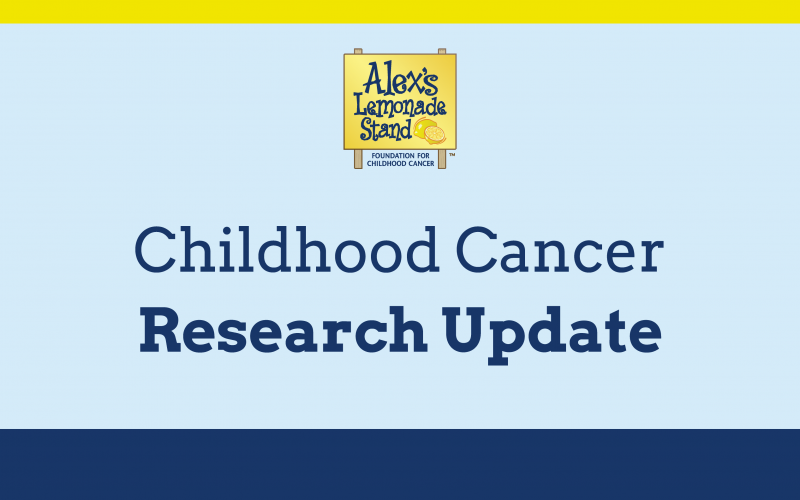
By: Anna C. Greene, PhD, ALSF Director of Science
June marks the halfway point of the year, and already Alex’s Lemonade Stand Foundation (ALSF) has been able to fund more than 40 research studies. ALSF funds a comprehensive grants program designed to find improved treatments and cures for children with cancer and new for 2021, we are enthusiastic to have committed $18.5 million to four game changing, collaborative projects through the ALSF Crazy 8 Initiative.
Of course, ALSF has been funding research grants since our founder, Alex Scott, held her first front yard lemonade stand 21 years ago. That investment continues to pay off for children with cancer and with the generous donations from our supporters, ALSF remains dedicated to finding cures through innovative research for all children.
There are two emergent trends in childhood cancer research — targeted treatments that precisely attack cancer cells over healthy cells and immunotherapy which harnesses the body immune system to attack cancer cells — that continue to offer promise for children. This quarter, I want to highlight two ALSF-funded projects that lean into those trends:
A New Way to Think About Drug Development and Genetic Dependencies
A team of researchers including Adam Durbin, MD/PhD, Assistant Member at St. Jude Children’s Research Hospital and 2018 ALSF Young Investigator recently published a first look at genetic dependencies between adult and pediatric cancers in Nature Genetics.
Childhood cancers have fewer mutations when compared with adult cancers, and some childhood cancers are driven by a single genetic mutation, such as the EWSR1/FLI1 fusion in Ewing sarcoma. In this study, the research team took a new approach to drug discovery. Rather than solely focusing on single, driver mutations, the team looked for other genes that cancer cells relied upon for survival that could serve as drug targets.
“This work provides a new baseline to understand what the genes that control the growth of pediatric solid tumors are,” said Dr. Durbin. “Lots more needs to be done, but this work provides a foundation on which we can build, to drive forward inroads into discovery of new targets in pediatric solid tumors. These, of course, are diseases for which we need new targets, to derive new treatments to benefit children with these diseases.”
The team ran a series of experiments where genes were individually knocked out to assess which genes were essential for a tumor cell’s survival. These genes could represent new therapeutic opportunities. They screened 82 different pediatric cancer cell lines representing 13 types of solid tumor or brain tumor.
Interestingly, they found similar numbers of genetic dependencies between pediatric and adult cancers. Even though pediatric cancers have fewer genetic mutations, they still have many genetic dependencies that could be exploited. Some of these could represent an opportunity for repurposing of adult drugs; however, there were numerous other dependencies that were pediatric specific, suggesting opportunities for new drug development for pediatric targets.
This study created a first-generation pediatric cancer dependency map that is available for download through the DepMap Portal.
Improving CAR T Cell Immunotherapy for Solid Tumors
Jessica Wagner, PhD, a 2019 ALSF Young Investigator from St. Jude Children’s Research Hospital recently published research illustrating a unique approach to chimeric antigen receptor (CAR) T cell immunotherapy for solid tumors. The work was published in the journal Cancer Immunology Research and made the cover of the journal!
CAR T cell immunotherapy uses a patient’s own T cells, a type of immune cell, to target a specific protein on the surface of cancer cells to preferentially kill cancer cells over normal, healthy cells. This type of therapy has been successful in treating some patients with B-cell leukemia, but has had much less success in pediatric solid tumors for many reasons including a lack of specific targets on solid tumor cells that differ from those on normal cells.
The goal of Dr. Wagner’s project is to develop a CAR T cell immunotherapy that recognizes both the tumor and the surrounding tumor environment. Targeting both the tumor and surrounding tumor environment should increase specificity of the therapy, allowing the therapy to eliminate the tumor cells and decrease toxicity for healthy cells.
Tumors secrete unique molecules that adhere to their cell surface and may serve as targets for immunotherapy. The target that Dr. Wagner and her team are investigating is called extra domain B fibronectin (EDB), and it is found in a wide range of solid tumors (e.g. lung, breast, prostate cancers as well as high-grade gliomas).
Dr. Wagner developed EDB-targeting CAR T cells and found that they were able to kill tumor cells and slowed tumor growth against mouse models of high-grade glioma, lung cancer and sarcoma without obvious toxicity. This study showcases a new approach for CAR T cell immunotherapy for solid tumors.
“Based on our encouraging results we are currently optimizing our approach with the ultimate goal of developing a clinical study for pediatric patients with solid tumors in the future, ”
said Dr. Wagner.

Anna C. Greene, PhD is the Alex's Lemonade Stand Foundation Director of Science. Dr. Greene works to connect ALSF-funded research to stories that describe scientific breakthroughs. She also evaluates the ALSF research portfolio to track progress and to find gaps in knowledge or funding so that ALSF can direct more research dollars to the largest areas of need. Each quarter, Dr. Greene will share highlights from researcher's work in the field in the ALSF Childhood Cancer Blog.

